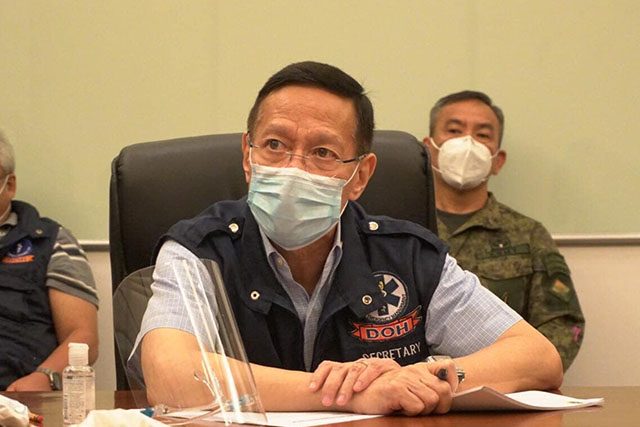
Health Secretary Francisco Duque III dismissed concerns that the government is being reactive in its response to emerging threats in the pandemic, such as the local transmission of the coronavirus’ Delta variant.
“Baliktad. We are proactive, not reactive,” Duque said in an interview on CNN Philippines.
“The fact that we still have low numbers of Delta variant is already proof in itself that the Philippine Genome Center has been doing a good job of really identifying or detecting among the positive samples the different variants since January, ‘di ba?” he added.
By the time of his interview, the country had recorded 119 Delta variant cases so far. It has since increased to 216 as of Thursday, July 29, 2021.
While the number of detected Delta variant cases remains in the lower hundreds, independent researchers at OCTA noted an increase of nearly a thousand new cases daily in the populated capital region.
“Right now, it’s official: we are in a surge here in the National Capital Region,” OCTA fellow Ranjit Rye said at a government briefing. “We can’t disregard or not pay attention to this increase.”
Whether the new cases are due to the spread of the Delta variant is not known as the official count coming from the Philippine Genome Center remains limited.
Prior to Duque’s remark lauding the low number of Delta variant cases, the Department of Health had said the genome center does not have the capacity to test all samples it receives.
Instead, genome sequencing tests are focused on areas with an unusually high increase in cases, in places where hospitals are reporting more severe types of COVID-19, in centers of infection, and among returning overseas Filipinos.
Duque’s insistence that the government is proactive in its approach was not well-received in some corners of social media.
“The numbers are low because we are not testing nor sequencing enough,” a Twitter user said, referring to mass testing and the genome sequencing of samples positive of COVID-19.
The numbers are low because we are not testing nor sequencing enough. https://t.co/W1ihlxY0h4
— ®️🅿️ (@ronp_md) July 29, 2021
“The low Delta variant numbers are due to the lack of [COVID-19] testing. Should we wait for it to increase before we do something??” another online user commented.
RT-PCR testing activity has indeed fallen. There have been fewer than 50,000 tests conducted for the eighth straight day from its highs of more than 63,000 two months ago.
To trace the Delta variant, funds are needed
An official of the Philippine Genome Center bared yesterday that it needs P100 million to expand biosurveillance efforts in the Visayas and Mindanao.
“Once we capacitate PGC Visayas and Mindanao, these will help the regions. Samples will be sequenced there,” Dr. Eva Maria Cutiongco-de la Paz, the genome center’s director for health programs said.
What is genome sequencing?
While an RT-PCR or swab test determines if one is infected with the virus, genome sequencing identifies the type of COVID-19 variant the person is infected with.
Currently, four variants of concern are present in the country—the Alpha, Beta, Gamma and Delta.
LGUs are advised to coordinate with DOH’s Regional Epidemiology and Surveillance Unit if they record a spike in cases, increase in mortality or anything unusual with the data in their jurisdictions.
The DOH unit will then send the samples to the genome center for sequencing.









